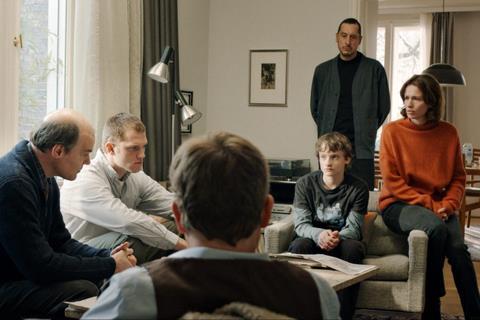The 1996 abduction of German scholar Jan Philipp Reemstma is explored through his teenage son’s eyes

Dir: Hans-Christian Schmid. Germany. 2022. 118mins.
The aftermath of an abduction proves to be a bumpy ride in We Are Next Of Kin, a slow-burn drama that zeroes in on the failure and uncertainty of those entrusted with bringing a kidnapped man home safely. Based on the 1996 capture of activist/scholar Jan Philipp Reemtsma, and adapted from his son Johann Scheerer’s autobiographical novel, the film is seen largely from the then-13-year-old boy’s perspective; dropping us into a world where parents, lawyers, police and other grownups make myriad mistakes, providing the teenager with a wake-up call about the fallibility of adults. Director Hans-Christian Schmid’s subdued, thoughtful film is gripped by Reemtsma’s predicament, but is just as interested in the de facto family that forms around Scheerer, who undergoes an unexpected coming-of-age in the process.
The picture has a spare chamber-drama tone, with Schmid focusing the action largely in the family home
This year’s Filmfest Hamburg opener represents Schmid’s first feature since 2012’s Home For The Weekend. Starring Claude Heinrich as the observant teen and Adina Vetter as his resilient mother, Next Of Kin will be released November 3 in Germany, where awareness of this case (and Scheerer’s work) should attract viewers.
Moody young Johann (Heinrich) plays in a rock band and doesn’t demonstrate much interest in his studies, disappointing his distinguished father Jan (Philipp Hauss) who tries to tutor his resentful son. Soon after, Jan is abducted, with the kidnappers demanding a large ransom, leaving wife Kathrin (Adina Vetter) to turn to the family’s longtime lawyer, Schwenn (Justus von Dohnanyi), to figure out what to do. Soon, two members of an elite task force, codenamed Vera (Yorck Dippe) and Nickel (Enno Trebs), are assigned to the house to talk strategy, with Johann watching as the events unfold over the course of a month.
In keeping with what actually took place, Next Of Kin is not a film filled with car chases or shootouts. Instead, the picture has a spare chamber-drama tone, with Schmid focusing the action largely in the family home — and on those trying to rescue Reemtsma. Both the kidnappers and Reemtsma himself are placed offscreen, his whereabouts (and even his condition) a worrying mystery.
The film isn’t shy about detailing the many potentially disastrous miscues that were orchestrated by those tasked with overseeing Reemtsma’s release. Law enforcement officials are initially presented as savvy veterans, but that doesn’t keep them from bungling ransom drop-offs and squabbling internally about how best to secure his rescue. Next Of Kin never lets us forget how fraught this high-stakes undertaking was — even more so because it took place at a time before cellphones and the internet were ubiquitous, the limits of technology becoming crucial plot points in the film. When the kidnappers call the house, Schwenn has difficulty making out what they’re saying because the line is so bad. A faulty fax machine creates plenty of headaches. And paper maps must be used when choosing rendezvous spots. All of these mid-1990s artefacts help give the picture a pleasingly old-fashioned, analogue quality, but also underline the obstacles in the way of Reemtsma’s rescue.
Heinrich nicely underplays his character’s silent guilt about blowing up at his father right before the abduction, fearful that his final encounter with Reemtsma will be one consumed by anger. His anguish is amplified by the fact that Reemtsma occasionally sends letters to the house, the father’s mental state dissolving as he becomes more anxious about what his captors might do if they don’t get their money. Heinrich’s vulnerable eyes and soft features hint at how Johann has grown up in luxury, his naivety now shattered by the cruel world’s harsh realities.
While the film keeps a close eye on Johann’s state of mind, Schmid also measures how this ordeal weighs on others in his orbit. Vetter plays Kathrin with steely calm, but she brings enough shading so that we sense the character’s fraying nerves – especially as the authorities continually foul up the hostage handoff. And von Dohnanyi is especially touching as a loyal lawyer who discovers that engaging in pressurised negotiations with kidnappers may be too much for him to handle.
Intriguingly, Schmid often emphasises the tedium that dominates such standoffs. Johann and the adults play games, watch talk shows and generally wait for the perpetrators to call again — all the while worrying what will happen if they don’t. The filmmaker lets these in-between moments produce a teasingly off-kilter rhythm for the narrative. (In some ways, the downtime is as nerve-racking as the more intense scenes when the task force plots its next step.) True to the film’s gradual pace and carefully measured, realistic tone, the finale is almost anticlimactic. But within that ending, Schmid subtly illustrates how this gruelling odyssey has forever changed a family — and the impressionable young man at its centre.
Production company: 23/5 Filmproduktion
International sales: The Match Factory, info@matchfactory.de
Producers: Britta Knoller, Hans-Christian Schmid
Screenplay: Michael Gutmann, Hans-Christian Schmid, based on the book by Johann Scheerer
Cinematography: Julian Krubasik
Production design: Zazie Knepper
Editing: Hansjorg Weißbrich
Music: The Notwist
Main cast: Claude Heinrich, Adina Vetter, Justus von Dohnanyi, Hans Low, Yorck Dippe, Enno Trebs, Fabian Hinrichs, Philipp Hauss
























